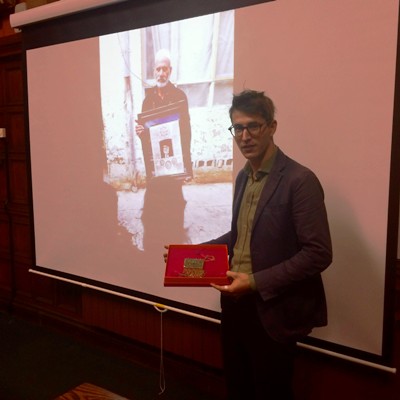 The aim of TOSCCA is to bring together scholars working on the Caucasus and Central Asia from a wide variety of disciplinary backgrounds to discuss the opportunities and challenges in researching contemporary and historical themes in the region. We are delighted to hold the Seminar in partnership with the Nizami Ganjavi Programme for the Study of Languages and Cultures of Azerbaijan and the Caucasus (NGP), a new initiative based in the Faculty of Oriental Studies.
The aim of TOSCCA is to bring together scholars working on the Caucasus and Central Asia from a wide variety of disciplinary backgrounds to discuss the opportunities and challenges in researching contemporary and historical themes in the region. We are delighted to hold the Seminar in partnership with the Nizami Ganjavi Programme for the Study of Languages and Cultures of Azerbaijan and the Caucasus (NGP), a new initiative based in the Faculty of Oriental Studies.
TOSCCA’s geographical remit – loosely defined as the former Soviet states of Central Asia and the Caucasus, with Afghanistan and western China – is very broad and yet this part of the world has traditionally received surprisingly little attention in academia. Needless to say, global awareness has shifted rapidly over the last few years, and this region is now as much a focus of economic and political attention as it is an expanding area for tourist explorers, keen to traverse its vast wild landscapes and follow the fabled Silk Roads.
The main impetus behind the creation of the Seminar is the rapidly growing number of researchers across the University with interests in the Caucasus and Central Asia, who have until now remained relatively unconnected. By inviting external specialists to present their research under the umbrella of interdisciplinary themes, we are hoping to showcase the breadth of current scholarship in this field and inspire new research collaborations. Talks this term are directed at the question of bridging the past and present, with several lecturers highlighting in particular the use of the past in the post-Soviet nation building. Our guest speakers hail from across the UK, Europe and Asia and have a range of academic backgrounds from political science to history and archaeology. Touching on a number of hot topics, we anticipate a great deal of lively debate in the Seminar and we are excited about this opportunity to establish a presence for the Caucasus and Central Asia both at the University and at Brasenose.
The Seminar is held on Tuesdays at 5pm in Lecture Room XI and is open to Oxford students and staff. Any queries please contact [email protected].
Image: Dr Thomas Wide presents on the fascinating historical political development of Afghanistan in the 19th Century. In his hand he shows the Seminar a piece of recent artistic jewellery manufactured for the Turquoise Mountain Foundation, an NGO based in Kabul whose remit is to promote development through sustainable traditional crafts. The emerald necklace, worth an estimated £100,000 will be one of the centrepieces at a new exhibition of artists from the Turquoise Mountain Foundation at the Smithsonian Institute, Washington D.C.
By Dr Paul D. Wordsworth
Research Fellow, Oxford Nizami Ganjavi Programme, Oriental Institute
Golding Junior Research Fellow, Brasenose College, Oxford
